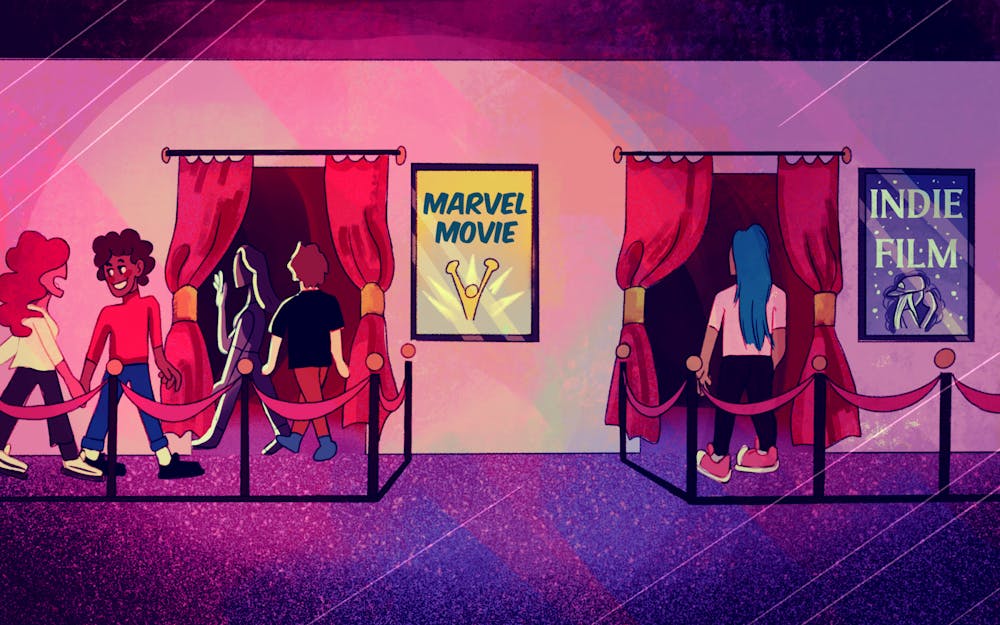I don’t hate the Marvel Cinematic Universe for any personal reason. The earliest film I remember calling my favorite was “Iron Man,” which, for 5-year-old me, was nothing short of a revelation. Like innumerable moviegoers around the globe, I was there opening weekend for both “Avengers: Infinity War” and “Avengers: Endgame.” I credit the MCU, in part, with inspiring my love for film more broadly.
However, for the past year or so, I’ve found myself drifting away from Marvel and most superhero films in general. Although I first assumed this was a classic case of “superhero fatigue,” I realized it was symptomatic of a larger issue within the film industry: it’s easy to grow tired of a franchise that essentially puts out a remake of the same film again and again with little in the way of creative freedom or experimentation.
As I’ve grown older and expanded my movie taste, and as the world has moved past that initial novelty factor of the cinematic universe idea, it has become clearer and clearer that the MCU has had a net negative effect on the film industry at-large.
[Related: OPINION: Horror films have always been meaningful]
I’m reminded of the controversy filmmaker Martin Scorsese sparked in 2019 when he infamously stated that Marvel films “aren’t cinema.” In an op-ed for the New York Times, Scorsese expanded on this point and argued that Marvel films are “designed as variations on a finite number of themes.”
With the MCU, Marvel has found a basic formula that’s been engineered to be as pleasing as possible to as wide an audience as possible. There's no room for depth or experimentation or aesthetic virtue because those things are risks the studio’s not comfortable with taking. This isn’t to suggest that franchise films are strangers to basic formulas — watch each of the “Star Wars” or “Indiana Jones” films back-to-back and you’re sure to find a throughline — but never have franchises been conducted on the scale of the MCU.
Case in point: according to Box Office Mojo, four Marvel films land among the top 10 highest-grossing films of all time. Just last year alone, three Marvel films made over $300 million domestically. Marvel has become something akin to a factory, pumping out three or four films every year that are bound to make a herculean amount of money.
And this factory style — this shared visual aesthetic and script formula and propensity for quick and easy cash — has spread across the box office like a plague as other studios have begun to attempt what Disney perfected. Artistically valuable superhero films do exist — in recent years we’ve seen examples like “Logan,” “The Batman” and “Spider-Man: Into the Spider-Verse” — but they’re becoming rarer and rarer. And that isn’t even to mention the increasing failure of standalone features backed by major studios.
[Related: Buskirk-Chumley Theater to screen ‘Hoosiers,’ ‘The Room’ and more in January and February]
Take, for example, Paramount’s “Babylon” which, although released to mixed reviews, had all the makings of a blockbuster: A-list actors like Brad Pitt and Margot Robbie, a critically and commercially successful director and a $78 million budget. Nevertheless, the film was a box office bomb, making only $41.7 million. “The Fabelmans” — Steven Spielberg’s newest picture — had a similar fate, making only $25 million on its $40 million budget.
We’re a long way away from the days when films like “The Graduate,” “The Godfather,” “Jaws” or “Back to the Future” could be the highest-grossing features of their respective years. While some of these films would go on to generate franchises — some more successful than others — the fact is they were conceived initially as standalone films with genuine artistic merit.
None of this is to say that there’s anything intrinsically wrong with enjoying the MCU, or superhero films in general, just like there’s nothing intrinsically wrong with enjoying junk food or radio pop music. But, if you only eat junk food or only listen to radio pop or only watch Marvel movies, you’re going to be missing a lot of good stuff.
Joey Sills (he/him) is a sophomore studying journalism and political science.






